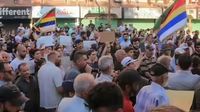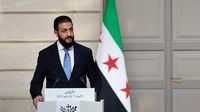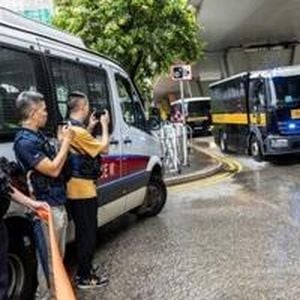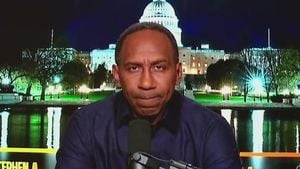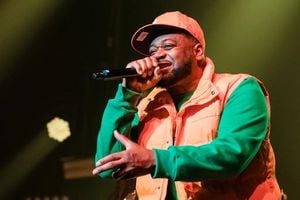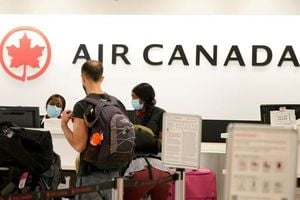In the heart of southern Syria, the province of Suwayda has erupted into a flashpoint that is testing the fragile post-Assad order, challenging both the unity and the authority of the new Syrian government. Over the weekend of August 16-17, 2025, thousands of Druze demonstrators poured into the streets of Suwayda’s central square, their banners and slogans signaling a seismic shift in the region’s political discourse. What began as calls for reform and political participation have now escalated into open demands for independence—and even more provocatively, the waving of Israeli flags alongside traditional Druze symbols.
According to reports compiled by The Syrian Observer and AFP, demonstrators chanted for the expulsion of government forces, the opening of border crossings, and, in a move that stunned both supporters and critics, full separation from the Syrian state. This unprecedented public display of separatist sentiment has sent shockwaves through the country’s political establishment and drawn the gaze of regional and international actors alike.
The Syrian government, led by President Ahmed al-Sharaa, responded swiftly. On Sunday, August 17, Sharaa addressed the nation, emphasizing the need for unity and dialogue over violence. "We still have another battle ahead of us to unify Syria, and it should not be with blood and military force... it should be through some kind of understanding because Syria is tired of war," Sharaa said during a dialogue session broadcast on state television, as reported by FRANCE 24. He firmly rejected any notion of partition, stating, "Some people desire a process of dividing Syria and trying to establish cantons... this matter is impossible."
Yet the situation on the ground is far from calm. The demonstrations in Suwayda, which erupted after a week of deadly clashes between Druze fighters and Sunni Bedouin tribesmen, have been fueled by longstanding grievances. Since the overthrow of Bashar al-Assad in December 2024, violence has continued to simmer, with minorities across Syria—especially the Druze—demanding greater autonomy and protection. The recent violence in Suwayda alone has claimed more than 1,600 lives since early July, according to Middle East Eye. The unrest also follows brutal sectarian violence in the coastal province of Latakia, where at least 1,500 members of the Alawi minority were killed in attacks traced back to officials in Damascus, as revealed by a Reuters investigation.
President Sharaa did not shy away from acknowledging his government’s shortcomings. In his televised speech, he admitted, "Sweida witnessed many violations from all sides... some members of the security forces and army in Syria also carried out some violations." He added, "The state is required to hold all perpetrators of violations to account, whatever their affiliation." This rare concession came amid accusations from Druze leaders and the Syrian Observatory for Human Rights that government forces had sided with the Bedouin and committed abuses, including summary executions.
The symbolism of Israeli flags at the Suwayda protests has only heightened tensions. For many in Syria, such a gesture crosses a political red line, raising suspicions of foreign interference. President Sharaa directly accused Israel of meddling in the south, declaring, "Israel is intervening directly in Sweida, seeking to implement policies aimed at weakening the state in general or finding excuses to interfere in ongoing policies in the southern region." Israel, for its part, has claimed its actions—including recent airstrikes on regime targets—are intended to protect the Druze minority and enforce the demilitarization of southern Syria.
The government’s response has been twofold: on one hand, it established a fact-finding committee and pledged to pursue diplomatic and conciliatory solutions. Suwayda’s governor, Mustafa al-Bakour, called for dialogue, reconciliation, and the preservation of national unity, stating that civil peace is “not a choice, but a necessity.” On the other hand, many demonstrators in Suwayda have dismissed these overtures, insisting on the complete withdrawal of state security forces and rejecting government-led investigations as inherently biased.
The political debate within Syria is as fractured as the streets of Suwayda. On a recent episode of "Syria Today," political analyst Hassan al-Daghim described the protests as "an overt separatist project supported by Israel," and accused prominent Druze clerics of ties to smuggling networks and remnants of the old regime. Legal scholar Bassam al-Ismi, however, argued that the unrest stems from "decades of systemic discrimination," blaming Damascus for deepening sectarian divides and failing to foster a sense of shared national identity. Meanwhile, commentator Rami Nakhla offered a different perspective, suggesting the protestors’ actions are driven more by "fear for their survival and children’s future" than by separatist ambitions, and warned that constant accusations of treason could further alienate the Druze community.
The crisis has not gone unnoticed by Syria’s neighbors. Security expert Omar al-Raddad told The Syrian Observer that Jordan is closely monitoring the situation but has rejected Israeli proposals to open a humanitarian crossing from Israel into Suwayda. Reports by Axios have also suggested that the United States is involved in discussions over a potential corridor, though Washington has not confirmed these claims. Analysts warn that what began as a local crisis could quickly become a regional bargaining chip, with Israel, the United States, and Arab states all potentially drawn into the standoff.
As the government in Damascus grapples with unrest in the south, it is also engaged in delicate negotiations with the semi-autonomous Kurdish administration that controls much of northern and northeastern Syria. Implementation of a March 10, 2025, agreement to integrate Kurdish civil and military institutions into the state has stalled over disagreements about decentralization—an issue the central government continues to reject.
Observers point to three possible scenarios for Suwayda’s future. The first is escalation, should moderate voices be ignored and violence continue to spiral. The second is containment, achievable only through genuine reconciliation and political inclusion. The third, and perhaps most concerning, is internationalization—where outside powers intervene, turning Suwayda into a pawn in the region’s broader geopolitical chessboard.
For now, Suwayda stands at a crossroads. The events of this past weekend have laid bare the deep fractures within Syrian society and the immense challenges facing President Sharaa’s government. Whether the crisis will lead to deeper fragmentation or open the door to a new, more inclusive settlement remains to be seen. What is clear is that the province’s fate—and perhaps that of Syria itself—hangs in the balance as the world watches closely.
